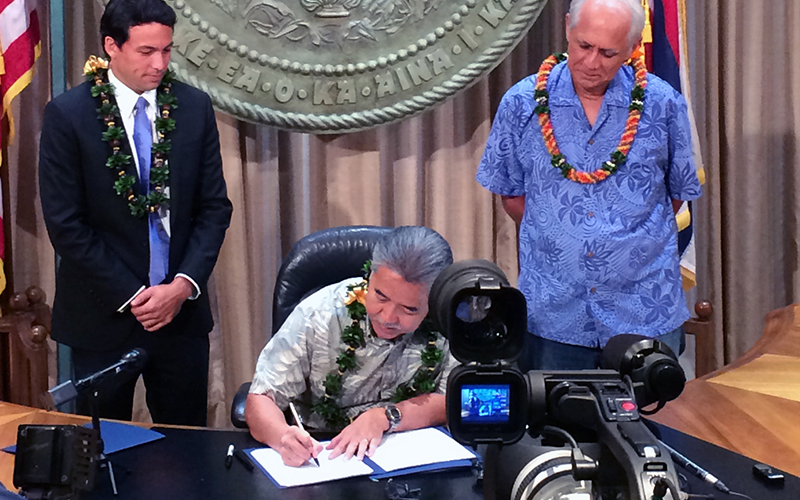
 |
| Hawaii Gov. Ige signs bill setting 100-percent renewable energy goal in power sector. |
 |
| Hawaii Gov. David Ige (center) is joined by State Rep. Chris Lee (left), Chair of the Energy & Environment Protection Committee, and State Sen. Mike Gabbard, Chair of the Water, Land and Agriculture Committee, as he signs into law four energy bills that strengthen the state's commitment to clean energy. |
| Gov. David Ige signed into law four energy bills, including one that strengthens Hawaii's commitment to clean energy by directing the state's utilities to generate 100 percent of their electricity sales from renewable energy resources by 2045. The bold step taken by the Legislature in passing the landmark legislation (HB263) fulfills one of Gov. Ige's policy objectives by making Hawaii the first state in the nation to set a 100-percent renewable portfolio standard (RPS) for the electricity sector. "As the most oil-dependent state in the nation, Hawaii spends roughly $5 billion a year on foreign oil to meet its energy needs," Ige said. "Making the transition to renewable, indigenous resources for power generation will allow us to keep more of that money at home, thereby improving our economy, environment and energy security. I'd like to thank the Senate and House energy committee chairs for championing HB263 and ensuring that Hawaii remains a national leader in clean energy." Another measure signed by Ige (SB1050) will help democratize renewable energy by creating a structure that will allow renters, condominium owners and others who have been largely shut out of Hawaii's clean energy transformation to purchase electricity generated at an off-site renewable energy facility, such as a large-scale solar farm. The bill establishing a community-based renewable energy program will be particularly valuable on Oahu where there is a high concentration of high-rise condominiums that don't have sufficient roof space to support on-site solar panels. The law will also is expected to provide relief to homeowners and businesses located on highly saturated circuits that can't accommodate additional photovoltaic installations. Setting a 100-percent renewable portfolio standard will help drive investment in Hawaii's growing clean energy sector, said Luis Salaveria, director of the Department of Business, Economic Development and Tourism. "Our commitment to clean energy has already attracted entrepreneurs and businesses from around the world, looking to develop, test and prove emerging technologies and strategies right here in Hawaii," Salaveria said. Raising the bar for renewable energy in Hawaii also will push the state to stay out in front on innovation, said Mark Glick, State Energy Office Administrator. "We are finding ways to be innovative both with technical solutions and financing structures that will help us meet our ambitious renewable energy goals," Glick said. In addition to the 100-percent RPS and community-based renewable energy bills, Ige signed into law a measure that sets a net-zero energy goal for the University of Hawaii system (HB1509) and another that designates a state hydrogen implementation coordinator (HB1296). |
Share this story:



|